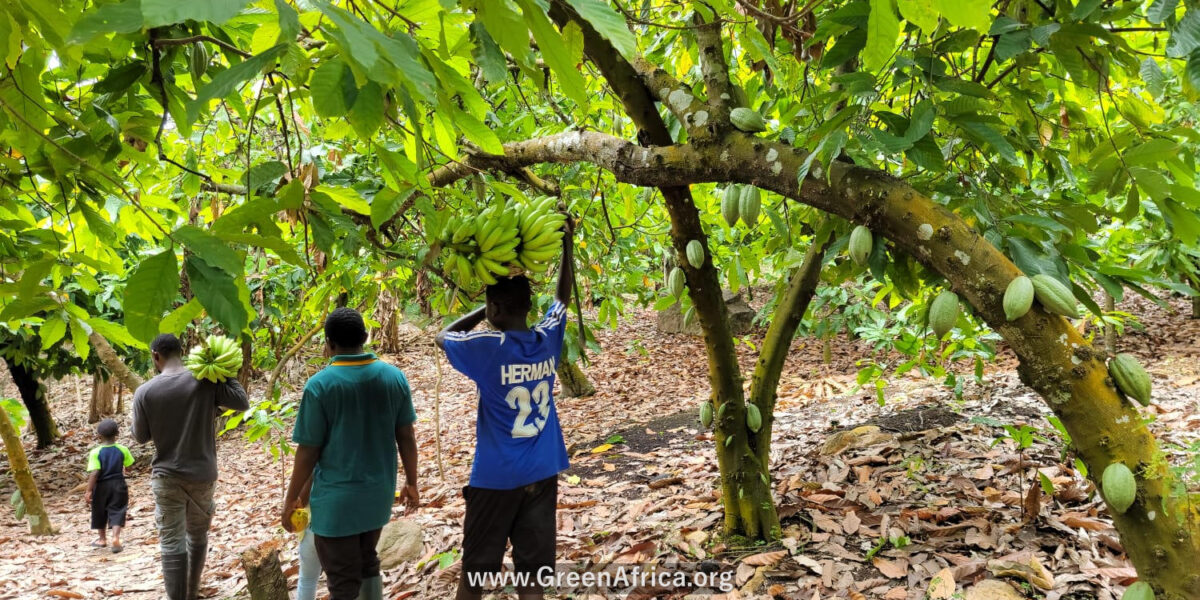
- Distribute 1 Million Seedlings Per Country: Cultivate and distribute at least 1 million seedlings of tree crops in every African country annually, enabling farmers to transition to profitable and sustainable agricultural systems.
- Alleviate Poverty: Provide farmers with free access to seedlings of valuable tree crops that offer high-yield, perennial income sources, helping to lift communities out of poverty.
- Boost Food Security: Support the establishment of food forests that deliver diverse and nutritious food products, ensuring year-round availability for families and markets.
- Restore Degraded Lands: Increase tree cover to combat soil erosion, enhance water retention, and improve soil fertility.
- Combat Climate Change: Promote agroforestry practices that sequester carbon, reduce deforestation, and build climate-resilient landscapes.
- Foster Sustainable Agriculture: Encourage farming systems that integrate trees with crops, reducing reliance on chemical inputs and creating ecological harmony.
- Seedling Production and Distribution:
- Establish a network of nurseries across regions, districts, and towns in each participating country to grow tree crop seedlings such as cocoa, avocado, mango, coconuts, cashew nuts, oil palm, rubber, plantain, and banana. This decentralized approach ensures nurseries are close to farmers, facilitating easy access, transportation, and timely distribution of seedlings.
- Seedlings will be distributed free of charge, prioritizing rural and underprivileged communities to maximize impact and accessibility.
- Farmer Support and Training:
- Provide localized training programs in collaboration with nursery hubs, offering guidance on planting techniques, agroforestry systems, and long-term tree care specific to each region.
- Provide ongoing support to farmers to ensure healthy tree growth and maximize yields.
- Food Forest Creation:
- Guide farmers in designing and establishing food forests, where tree crops are interplanted with vegetables, grains, and other cash crops.
- Promote diversity in tree species to optimize ecosystem benefits and ensure economic resilience.
- Focus on crops that thrive without chemical inputs and provide food, income, and ecological resilience.
- Agroforestry System Implementation:
- Encourage farmers to integrate tree crops into existing farms to improve productivity, create shade, and protect against soil degradation.
- Demonstrate the use of agroforestry techniques such as alley cropping, windbreaks, and shelterbelts to enhance farm sustainability.
- Community-Based Reforestation Efforts:
- Partner with communities to identify degraded lands for reforestation using tree crops that provide both environmental and economic benefits.
- Promote cooperative tree planting efforts that bring together smallholder farmers to share knowledge and resources.
- Support reforestation efforts that use fruit trees to benefit both the ecosystem and local communities.
- Monitoring and Scaling:
- Develop a regional monitoring system to track the performance of decentralized nurseries, seedling distribution, and their subsequent economic and environmental impact.
- Scale up operations by replicating successful models across new regions and countries.
- Economic Empowerment: Transition to commercial and perennial farming. Farmers gain long-term income through sustainable tree crop farming, lifting entire communities out of poverty.
- Increased Food Security: Food forests provide reliable, nutritious food sources for families and communities.
- Environmental Restoration: Large-scale tree planting efforts restore degraded lands, improve biodiversity, and combat desertification.
- Sustainable Farming Practices: Reduction in the use of chemical fertilizers and pesticides, promoting healthier ecosystems.
- Climate Mitigation: Millions of trees sequester carbon, reduce greenhouse gas emissions, and create climate-resilient ecosystems.
- Knowledge Transfer: Farmers gain skills and awareness of sustainable agriculture, spreading these practices to neighboring communities.
Tree Crop Seedlings Program – Building Food Forests and Agroforestry Systems:
This module forms the core of our NGO’s mission to alleviate poverty and combat climate change by empowering farmers across Africa with free tree crop seedlings. By establishing food forests and promoting agroforestry, we aim to create resilient agricultural systems that provide sustainable livelihoods, enhance food security, and restore degraded ecosystems.
Goals and Objectives
Key Activities
Expected Outcomes
Our Impact
This program addresses poverty alleviation, food security, and climate resilience by focusing on the mass production and free distribution of high-value tree crop seedlings.
Through decentralized nurseries located in regions, districts, and towns, farmers gain easy access to seedlings, reducing logistical challenges and ensuring even remote communities can benefit.
By integrating trees into farming landscapes and creating food forests, we are building resilient agricultural systems that sustain communities, restore degraded ecosystems, and combat climate change. This approach ensures that every farmer, regardless of their means, can benefit from the economic and environmental advantages of tree crops, laying the foundation for a sustainable and thriving Africa.
Ongoing and Completed Projects
The list of our projects will be updated.
Details of Activities
More info coming soon …
More info coming soon ….
More info coming soon …
